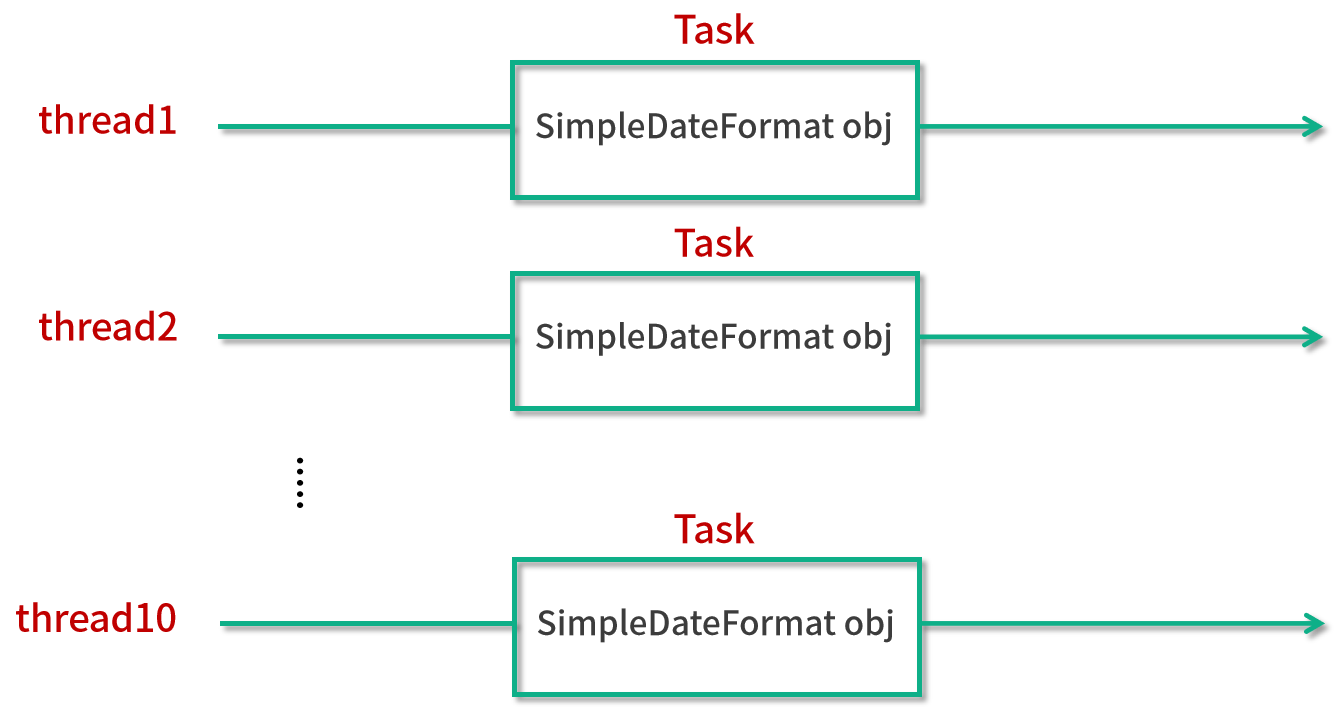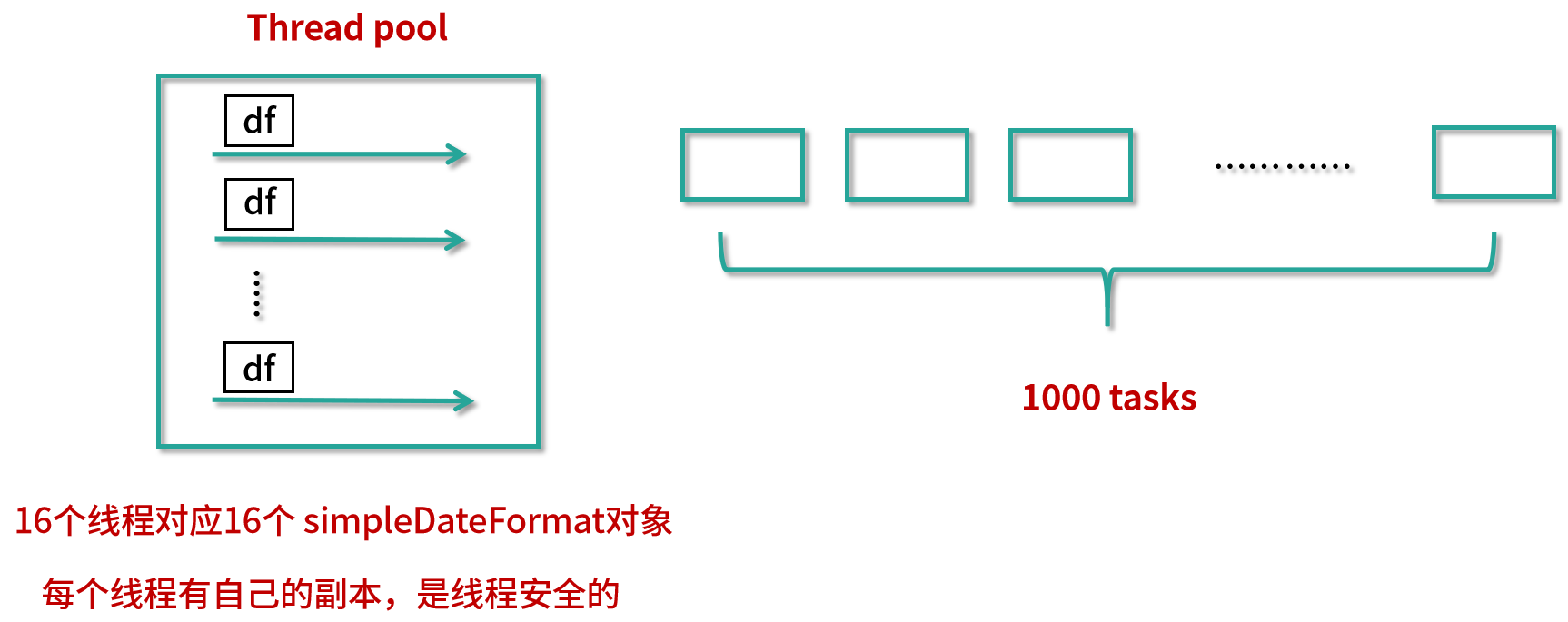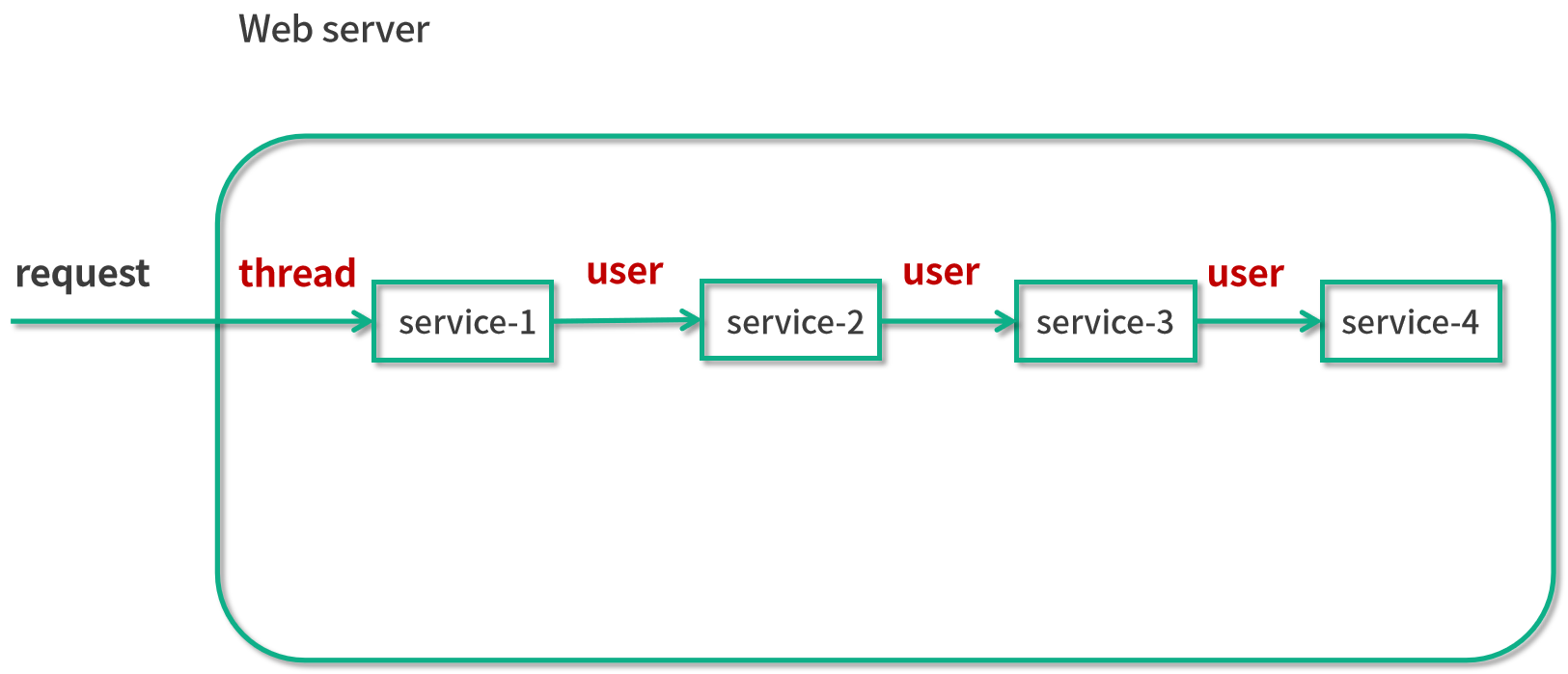ThreadLocal的应用场景
在通常的业务开发中,ThreadLocal 有两种典型的使用场景
场景1:
ThreadLocal 用作保存每个线程独享的对象,为每个线程都创建一个副本,这样每个线程都可以修改自己所拥有的副本, 而不会影响其他线程的副本,确保了线程安全。
场景2:
ThreadLocal 用作每个线程内需要独立保存信息,以便供其他方法更方便地获取该信息的场景。每个线程获取到的信息可能都是不一样的,前面执行的方法保存了信息后,后续方法可以通过ThreadLocal 直接获取到,避免了传参,类似于全局变量的概念。
典型场景1
这种场景通常用于保存线程不安全的工具类,典型的需要使用的类就是 SimpleDateFormat。
在这种情况下,每个Thread内都有自己的实例副本,且该副本只能由当前Thread访问到并使用,相当于每个线程内部的本地变量,这也是ThreadLocal命名的含义。因为每个线程独享副本,而不是公用的,所以不存在多线程间共享的问题。
比如有10个线程都要用到SimpleDateFormat
public class ThreadLocalDemo01 { public static void main(String[] args) throws InterruptedException { for (int i = 0; i < 10; i++) { int finalI = i; new Thread(() -> { String data = new ThreadLocalDemo01().date(finalI); System.out.println(data); }).start(); Thread.sleep(100); } } private String date(int seconds){ Date date = new Date(1000 * seconds); SimpleDateFormat simpleDateFormat = new SimpleDateFormat("mm:ss"); return simpleDateFormat.format(date); } }
我们给每个线程都创建了SimpleDateFormat对象,他们之间互不影响,代码是可以正常执行的。输出结果:
00:00 00:01 00:02 00:03 00:04 00:05 00:06 00:07 00:08 00:09
我们用图来看一下当前的这种状态:

如果有1000个线程都用到SimpleDateFormat对象呢?
我们一般不会直接去创建这么多线程,而是通过线程池,比如:
public class ThreadLocalDemo011 { public static ExecutorService threadPool = Executors.newFixedThreadPool(16); public static void main(String[] args) throws InterruptedException { for (int i = 0; i < 1000; i++) { int finalI = i; threadPool.submit(() -> { String data = new ThreadLocalDemo011().date(finalI); System.out.println(data); }); } threadPool.shutdown(); } private String date(int seconds){ Date date = new Date(1000 * seconds); SimpleDateFormat simpleDateFormat = new SimpleDateFormat("mm:ss"); return simpleDateFormat.format(date); } }
可以看出,我们用了一个16线程的线程池,并且给这个线程池提交了1000次任务。每个任务中它做的事情和之前是一样的,还是去执行date方法,并且在这个方法中创建一个
simpleDateFormat 对象。结果:
00:00 00:07 00:04 00:02 ... 16:29 16:28 16:27 16:26 16:39
我们刚才所做的就是每个任务都创建了一个 simpleDateFormat 对象,也就是说,1000 个任务对应 1000 个 simpleDateFormat 对象,但是如果任务数巨多怎么办?
这么多对象的创建是有开销的,并且在使用完之后的销毁同样是有开销的,同时存在在内存中也是一种内存的浪费。
我们可能会想到,要不所有的线程共用一个 simpleDateFormat 对象?但是simpleDateFormat 又不是线程安全的,我们必须做同步,比如使用synchronized加锁。到这里也许就是我们最终的一个解决方法。但是使用synchronized加锁会陷入一种排队的状态,多个线程不能同时工作,这样一来,整体的效率就被大大降低了。有没有更好的解决方案呢?
使用ThreadLocal
对这种场景,ThreadLocal再合适不过了,ThreadLocal给每个线程维护一个自己的simpleDateFormat对象,这个对象在线程之间是独立的,互相没有关系的。这也就避免了线程安全问题。与此同时,simpleDateFormat对象还不会创造过多,线程池一共只有 16 个线程,所以需要16个对象即可。
public class ThreadLocalDemo04 { public static ExecutorService threadPool = Executors.newFixedThreadPool(16); public static void main(String[] args) throws InterruptedException { for (int i = 0; i < 1000; i++) { int finalI = i; threadPool.submit(() -> { String data = new ThreadLocalDemo04().date(finalI); System.out.println(data); }); } threadPool.shutdown(); } private String date(int seconds){ Date date = new Date(1000 * seconds); SimpleDateFormat dateFormat = ThreadSafeFormater.dateFormatThreadLocal.get(); return dateFormat.format(date); } } class ThreadSafeFormater{ public static ThreadLocal<SimpleDateFormat> dateFormatThreadLocal = ThreadLocal.withInitial(() -> new SimpleDateFormat("mm:ss")); }
我们用图来看一下当前的这种状态:

典型场景2
每个线程内需要保存类似于全局变量的信息(例如在拦截器中获取的用户信息),可以让不同方法直接使用,避免参数传递的麻烦却不想被多线程共享(因为不同线程获取到的用户信息不一样)。
例如,用 ThreadLocal 保存一些业务内容(用户权限信息、从用户系统获取到的用户名、用户ID 等),这些信息在同一个线程内相同,但是不同的线程使用的业务内容是不相同的。
在线程生命周期内,都通过这个静态 ThreadLocal 实例的 get() 方法取得自己 set 过的那个对象,避免了将这个对象(如 user 对象)作为参数传递的麻烦。
比如说我们是一个用户系统,那么当一个请求进来的时候,一个线程会负责执行这个请求,然后这个请求就会依次调用service-1()、service-2()、service-3()、service-4(),这4个方法可能是分布在不同的类中的。
我们用图画的形式举一个实例:

代码:
package com.kong.threadlocal; public class ThreadLocalDemo05 { public static void main(String[] args) { User user = new User("jack"); new Service1().service1(user); } } class Service1 { public void service1(User user){ //给ThreadLocal赋值,后续的服务直接通过ThreadLocal获取就行了。 UserContextHolder.holder.set(user); new Service2().service2(); } } class Service2 { public void service2(){ User user = UserContextHolder.holder.get(); System.out.println("service2拿到的用户:"+user.name); new Service3().service3(); } } class Service3 { public void service3(){ User user = UserContextHolder.holder.get(); System.out.println("service3拿到的用户:"+user.name); //在整个流程执行完毕后,一定要执行remove UserContextHolder.holder.remove(); } } class UserContextHolder { //创建ThreadLocal保存User对象 public static ThreadLocal<User> holder = new ThreadLocal<>(); } class User { String name; public User(String name){ this.name = name; } }
执行的结果:
service2拿到的用户:jack
service3拿到的用户:jack




 浙公网安备 33010602011771号
浙公网安备 33010602011771号